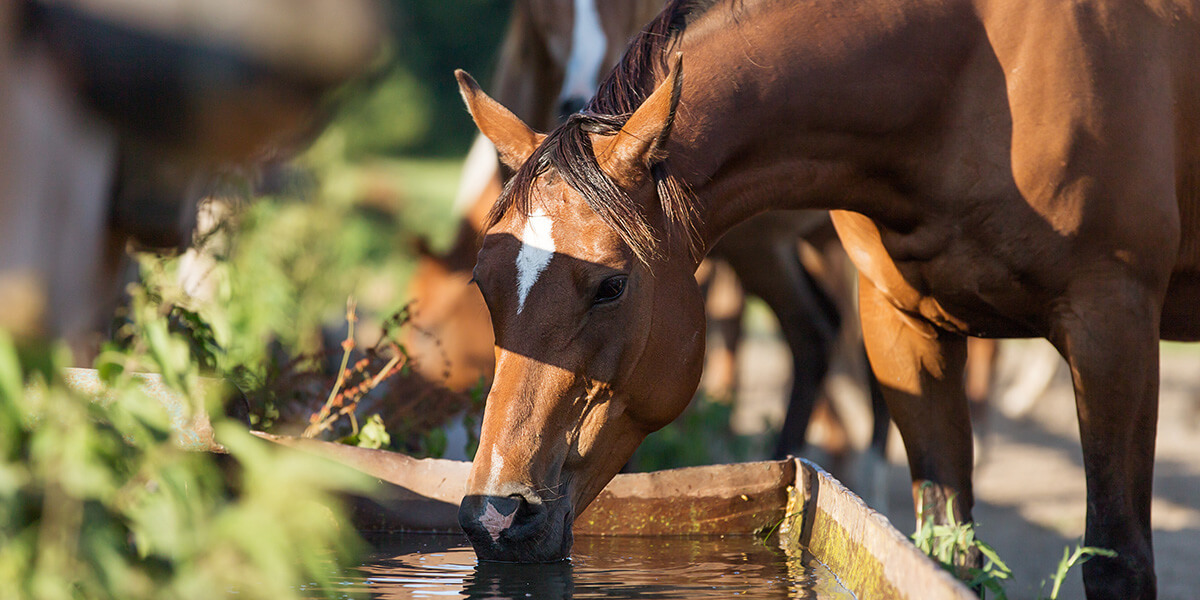Water Quality and Its Impact on Your Horses
In Part 1 of this series I discussed how to ensure your horse is getting the right amount of water each day to stay properly hydrated. In this second part, I’m sharing my thoughts on water quality and the impact it may have on the health of your horses.
While adequate water is the number one priority, water quality is a close second. In most cases, a hydrated horse is a healthy horse — but hydrating it with tainted water defeats the purpose. In the end, you may find yourself spending a lot of money to treat any number of issues to get your horse back on track.
Here are some of the more common water contaminants:
- Organic Matter/Minerals: Organic matter such as feed, manure or leaves contaminate water. Mineral contaminants in water (iron, manganese, calcium, sodium, fluoride, sulfate, etc.) are also a concern. Iron and manganese, for example, tend to cause water to taste bitter. Sulfide causes water to have a foul smell. Horses don’t particularly like either the taste or smell and may resist drinking it. Water pH can also be an issue as horses don’t like acidic water. Iron and calcium may affect the absorption of zinc and copper, which play key roles in skin and hoof integrity. You might also see a poor hair coat and dry flaky skin when zinc intake becomes compromised.
- Automatic Waterers: Algae growth can be an issue in tanks and waterers, especially if water flow is compromised. Stray voltage is occasionally a problem and should not be overlooked as it can prevent horses from drinking and should be monitored regularly. Automatic waterers and tanks with float valves should be regularly cleaned to prevent contaminants. If it’s been a while since it’s been checked, you’re likely to find it contains hay, manure or other matter that leads to poor water quality.
- Salt/TDS: High salt and/or high total dissolved solids (TDS) can decrease water intake. As these mineral contaminants increase, water intake tends to decline due to the water’s flavor or physically just turning the animal off due to the concentration.
Below are tips to help ensure the water you provide is most effective at hydration:
- Cold/Icy Water: You may think a cold drink after tough, physical exercise is more hydrating, but it isn’t. You’ll find that you can drink more and rehydrate yourself faster with water at room temperature. The same is true for horses. When rehydrating a horse, avoid water that’s cold or icy. You may be out working or riding and making them thirsty, and if you have groundwater at 55 degrees Fahrenheit or below and it’s 90 degrees Fahrenheit outside, that will be a pretty significant shock. Water in the 60- to 70-degree Fahrenheit range is much more acceptable and creates less digestive shock to the animal.
- Ponds and Streams: Allowing horses to drink from ponds and streams is not advisable. These sources may be contaminated with algae, pollution, pesticides, diseased organisms such as bacteria, viruses, protozoa or parasites — and possibly drugs. If it’s a stream, it may be contaminated with sewage coming from human waste. Some studies have shown significant amounts of hormones and pharmaceuticals in wastewater, and some municipalities simply treat it and dump it back into the streams. That water isn’t ideal for your horses to consume.
Provide Plenty of Fresh and Clean Water
Poor water quality is a concern mainly because it lowers a horse’s intake and can lead to dehydration. It also has consequences on function of the gastrointestinal tract and leads to an increased risk for colic or impaction. It can also be directly tied to poor kidney function or kidney failure. To keep your horses properly hydrated, take the time to ensure the water you’re providing is an adequate amount, and is clean and fresh.
For a more in-depth look at the importance of water for your horses, check out the Kentucky Equine Research website. Learn more about the Zinpro H2O Water Analysis Program, and see how we can help you compare the results of a water test with industry standards.

